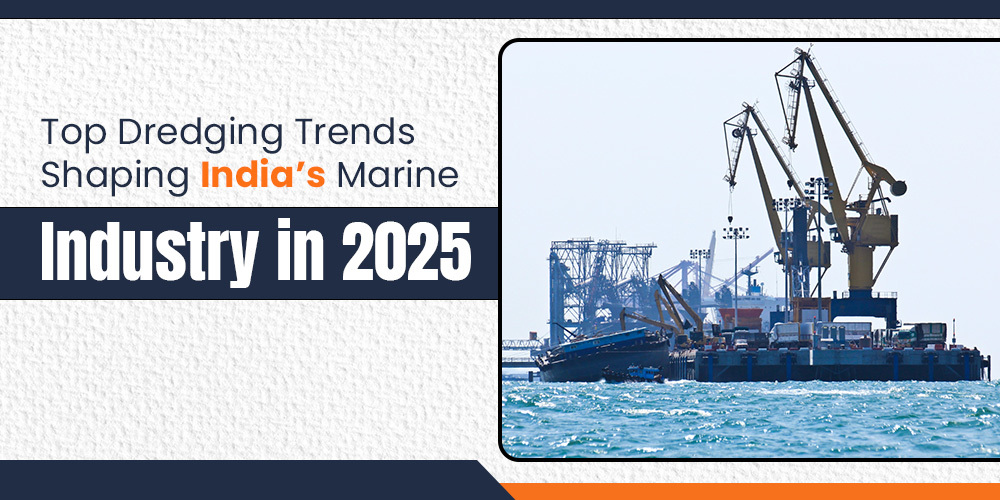Blogs

Top Dredging Trends Shaping India’s Marine Industry in 2025
India’s Marine Industry is on the cusp of a transformative era, driven by rapid technological advancements, environmental imperatives, and the nation’s ambitious infrastructure goals. Dredging, a cornerstone of marine development, is evolving at an unprecedented pace. As a leader in the field, Rock & Reef has witnessed-and contributed to-these dynamic changes. Here, we explore the top dredging trends set to shape India’s marine industry in 2025.
1. Technological Advancements in Dredging Equipment
The adoption of cutting-edge technology is revolutionizing dredging operations across India. Modern dredgers are now equipped with GPS-guided systems, real-time monitoring, and automation. These innovations not only enhance precision and efficiency but also minimize human error and operational downtime.
Key Developments:
- Automated Dredging: Robotics and AI-powered control systems are enabling unmanned operations, reducing risks and costs.
- Real-Time Data Analytics: Sensors and IoT devices provide instant feedback, allowing for proactive maintenance and optimized performance.
- Eco-Friendly Equipment: Newer dredgers are designed to consume less fuel and emit fewer pollutants, aligning with global sustainability goals.
At Rock & Reef, we continually invest in the latest dredging technologies to ensure our clients benefit from faster, safer, and more cost-effective solutions.
2. Sustainable and Green Dredging Practices
Environmental stewardship is no longer optional-it’s a necessity. The Indian government and global agencies are tightening regulations to protect marine ecosystems, making sustainable dredging a top priority.
Emerging Practices:
- Sediment Reuse: Instead of disposing of dredged material, companies are finding ways to repurpose it for land reclamation, construction, and habitat restoration.
- Low-Impact Techniques: Precision dredging and silt curtains minimize turbidity and protect aquatic life.
- Carbon Footprint Reduction: Electrification of dredging equipment and alternative fuels are gaining traction.
Rock & Reef is committed to sustainable practices, balancing economic development with the preservation of India’s rich marine biodiversity.
3. Digitalization and Smart Project Management
Digital transformation is streamlining every aspect of dredging projects, from planning to execution and reporting.
Key Trends:
- Building Information Modeling (BIM): 3D modeling helps visualize projects, anticipate challenges, and improve stakeholder communication.
- Cloud-Based Collaboration: Teams can access data and updates in real-time, ensuring transparency and faster decision-making.
- Dredging Management Software: Custom platforms track progress, costs, and compliance, reducing administrative burdens.
Our client-centric approach at Rock & Reef leverages digital tools to deliver projects on time, within budget, and to the highest standards.
4. Focus on Capital Dredging for Port Expansion
India’s vision to become a global trade powerhouse hinges on modern, deep-draft ports. Capital dredging-deepening and widening waterways-is essential for accommodating larger vessels and boosting cargo capacity.
Industry Drivers:
- Sagarmala Project: This flagship initiative aims to modernize ports and logistics, requiring extensive capital dredging.
- Private Sector Participation: Increased investment from private players is accelerating port expansion and modernization.
- Multi-Modal Connectivity: Dredging supports the integration of ports with road, rail, and inland waterways.
With over 25 years of experience and more than 100 successful projects, Rock & Reef stands at the forefront of capital dredging for India’s evolving port infrastructure.
5. Emphasis on Maintenance Dredging and Lifecycle Management
While capital dredging grabs headlines, maintenance dredging is the unsung hero that keeps ports, harbors, and waterways operational year-round.
Trends to Watch:
- Predictive Maintenance: Data-driven insights help schedule dredging activities before siltation hampers navigation.
- Asset Management: Lifecycle strategies ensure that infrastructure investments deliver long-term value.
- Environmental Monitoring: Continuous assessment ensures compliance with environmental standards.
Rock & Reef’s unparalleled execution and reliability ensure that maintenance dredging is performed efficiently, safeguarding the nation’s maritime assets.
6. Integration of Renewable Energy in Dredging Operations
As India accelerates its renewable energy transition, the marine industry is following suit. Dredging companies are exploring ways to power equipment with solar, wind, and hybrid systems.
Benefits:
- Reduced Operational Costs: Renewable energy can lower fuel expenses and stabilize long-term costs.
- Enhanced Sustainability: Lower emissions contribute to cleaner air and water.
- Regulatory Compliance: Meeting stricter environmental norms is easier with greener operations.
Rock & Reef is exploring renewable energy integration to further reduce our environmental footprint and support India’s clean energy goals.
7. Skill Development and Workforce Transformation
The future of dredging is not just about machines-it’s about people. As technology evolves, so must the skills of the workforce.
Key Initiatives:
- Training in Advanced Equipment: Operators are being upskilled to handle sophisticated machinery and digital platforms.
- Safety and Compliance: Emphasis on health, safety, and environmental (HSE) training is stronger than ever.
- Attracting Young Talent: The industry is working to make dredging an attractive career choice for India’s youth.
At Rock & Reef, we invest in continuous learning and professional development to maintain our leadership in the industry.
8. Collaboration and Public-Private Partnerships
Complex dredging projects increasingly require collaboration between government agencies, private companies, and international experts.
Emerging Models:
- Public-Private Partnerships (PPP): Shared investment and risk drive innovation and efficiency.
- Cross-Border Projects: Regional cooperation is enhancing connectivity and trade.
- Knowledge Sharing: Industry forums and conferences promote best practices and technological exchange.
Rock & Reef’s strong partnerships and transparent communication set new standards for collaboration and project success.
Conclusion
The Indian marine industry is entering a new era, with dredging at its core. From technological innovation and sustainability to digital transformation and skilled workforce development, the trends shaping 2025 are setting the stage for unprecedented growth and resilience.
As a trusted leader with over 25 years of experience, Rock & Reef is proud to drive these trends, delivering excellence, reliability, and sustainable solutions for India’s marine future.
Ready to build your dream marine project? Contact Rock & Reef today for expert dredging and marine engineering solutions.

